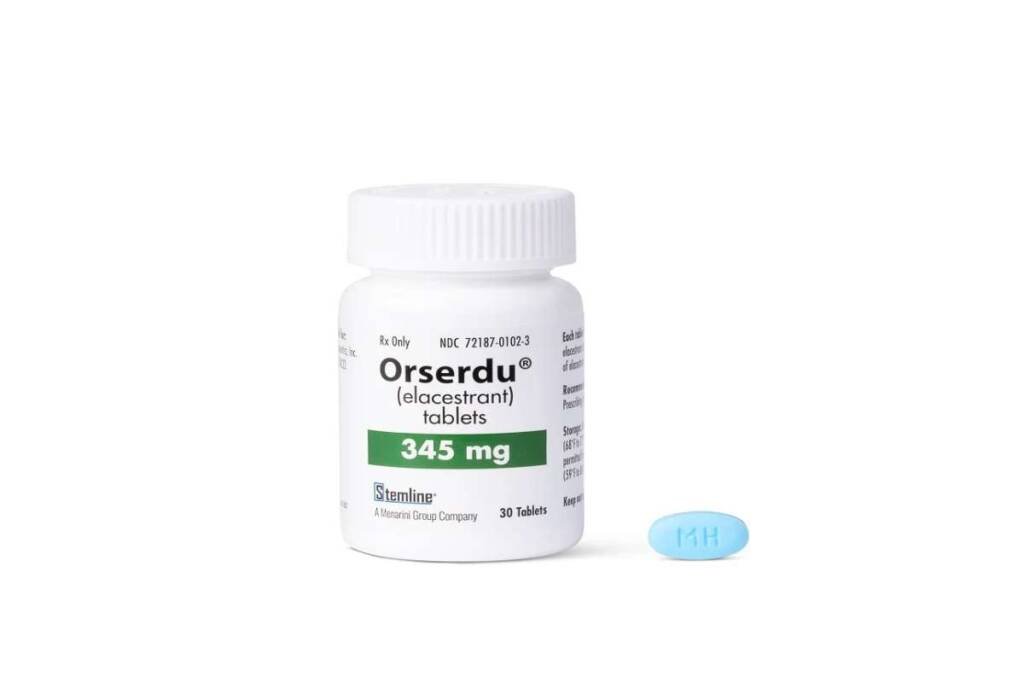Source – Menarini Group
A new treatment option for postmenopausal women with advanced or metastatic breast cancer has moved a step closer to approval in the European Union. The CHMP of the EMA has issued a positive opinion for elacestrant (Orserdu), a novel drug that targets the estrogen receptor (ER) and inhibits its activity. Elacestrant is intended for patients with ER-positive, HER2-negative, ESR1-mutated breast cancer who have progressed on at least one previous hormone therapy.
The positive opinion is based on the results of the Phase III EMERALD trial (NCT03778931), which compared elacestrant with standard-of-care hormone therapy in 478 patients in the second- and third-line settings. The trial met its primary end points of PFS in both the overall population and the ESR1-mutated subgroup. Elacestrant significantly prolonged PFS compared with standard of care, with a median of 3.8 months vs. 1.9 months, respectively, and a 45% reduction in the risk of progression or death (HR, 0.55; 95% CI, 0.39-0.77) in the ESR1-mutated subgroup.
“Patients living with metastatic breast cancer are in need of efficacious and tolerable treatment options. ORSERDU may become the first product, if approved by the European Commission, indicated in ER+, HER2- advanced breast cancer with ESR1 mutations, which are a strong driver of resistance to treatment in up to 40% of patients in second line mBC. ORSERDU, if approved, will also provide a convenient daily oral treatment. We are proud of today’s positive CHMP opinion as it reflects our commitment to developing innovative solutions that address the greatest unmet needs in cancer treatment, and brings us one step closer to providing an important new option to the patients and families impacted by ESR1-mutated, ER+, HER2- metastatic breast cancer.”
– Elcin Barker Ergun, CEO of the Menarini Group
A post-hoc analysis of the EMERALD trial, presented at the 2022 SABCS, showed that elacestrant was particularly effective in patients who had received longer prior treatment with CDK4/6 inhibitors, a class of drugs that are commonly used in combination with hormone therapy for advanced breast cancer. Patients with ESR1 mutations who had received a CDK4/6 inhibitor for 12 or more months before entering the trial had a median PFS of 8.6 months with elacestrant, compared with 1.9 months with standard of care. Elacestrant reduced the risk of progression or death by 59% (HR, 0.41; 95% CI, 0.26-0.63) in this subgroup.
The safety profile of elacestrant was comparable with previous reports. The most frequent adverse effects of grade 3 or higher were nausea (2.7%), increased aspartate aminotransferase (2.7%), increased alanine transaminase (2.3%), anemia (2%), back pain (2%), and bone pain (2%).
“As an oncologist, it is remarkable that we are on the cusp of having the first treatment option for patients with advanced or metastatic ER+, HER2- breast cancer harboring ESR1 mutations, which occur in up to 40% of patients in the metastatic setting. Elacestrant has demonstrated efficacy and a manageable safety profile, underscoring the potential benefit this therapy may soon bring to the patients we care for, and to the broader oncology community.”
– Giuseppe Curigliano, MD, PhD, Professor of Medical Oncology at the University of Milano and the Head of the Division of Early Drug Development at the European Institute of Oncology, IRCCS, Italy
The European Commission will review the CHMP opinion and decide whether to grant marketing authorization for elacestrant in the EU. Elacestrant has already been approved by the FDA for this patient population in January 2023, making it the first new drug for ER-positive advanced breast cancer in over two decades.





























